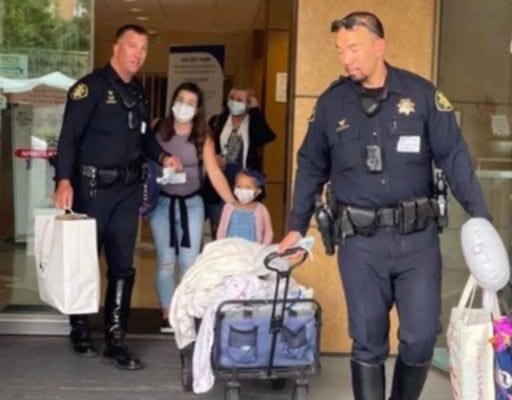Before we got in the van, one of the officers handed me a plain white envelope.
“Open it once you’re inside,” he said with a quiet smile.
Now seated in the van, I turned the envelope over in my hands. In the corner, a name was written in faded ink: Derek Monroe.
Callie tugged at my sleeve. “Mommy, can we get ice cream?”
Her innocence nearly shattered me. I didn’t want to explain we couldn’t afford it—not yet, maybe not for a while.
“Maybe later,” I told her. “Let’s see where we’re going first.”
As the van rolled through the city, her excitement over small things—colorful murals, a dog crossing the street—was a reminder to keep going.
Eventually, we pulled into a quiet neighborhood lined with modest, welcoming homes. We stopped in front of a blue house with white shutters. A kind-faced woman stood waiting on the porch.
“This is your temporary placement,” one officer said. “Mrs. Harper will help you get settled.”
Still unsure what it all meant, I reached for the envelope again.
Inside was a single sheet of paper and a key attached to a small card. It read:
“This isn’t charity. This is family. Go to 427 Maple Street. Everything will make sense there.”
The address matched the house we had just arrived at.
I opened the letter—and tears welled in my eyes as I read the familiar handwriting. It was from my brother, Derek.
We hadn’t spoken in years. Life had separated us after college. But the letter explained he’d been quietly following our journey—through friends, social media, mutual connections. When he learned about Callie’s illness, he stepped in from behind the scenes.
“This house is mine,” the letter said. “It’s paid for, fully furnished, and it’s yours for as long as you need it. No strings. Just let me be part of your lives again.”
Mrs. Harper returned with cookies and lemonade. I handed her the letter, and she smiled gently after reading it.
“He’s a good man,” she said. “He wanted to make sure you were safe and supported.”
Over the next few days, Derek reached out. At first, it was simple check-ins. Then one evening, he brought dinner and board games. Callie lit up around him. Her laughter filled the house for the first time in months.
With Derek’s help, I found part-time work at a local bookstore. Callie started school again. Slowly, stability returned.
One evening, as the sky turned golden, Derek sat beside me on the porch and said, “None of this changes the past. But you’re still my sister. Always have been.”
I nodded, eyes misty. “Thank you—for not giving up on us.”
Life still brings challenges, but we face them together now. And in this little house, filled with second chances, I’ve learned something powerful:
Sometimes, the support we need comes when we least expect it.
If you’re going through a hard season, please remember—you’re not alone. Reach out. Ask for help. And if someone offers you kindness, take it.
Because family isn’t always about history. Sometimes, it’s about hope.
If this story moved you, please like and share. Let someone else know that brighter days can begin with a single act of love.



